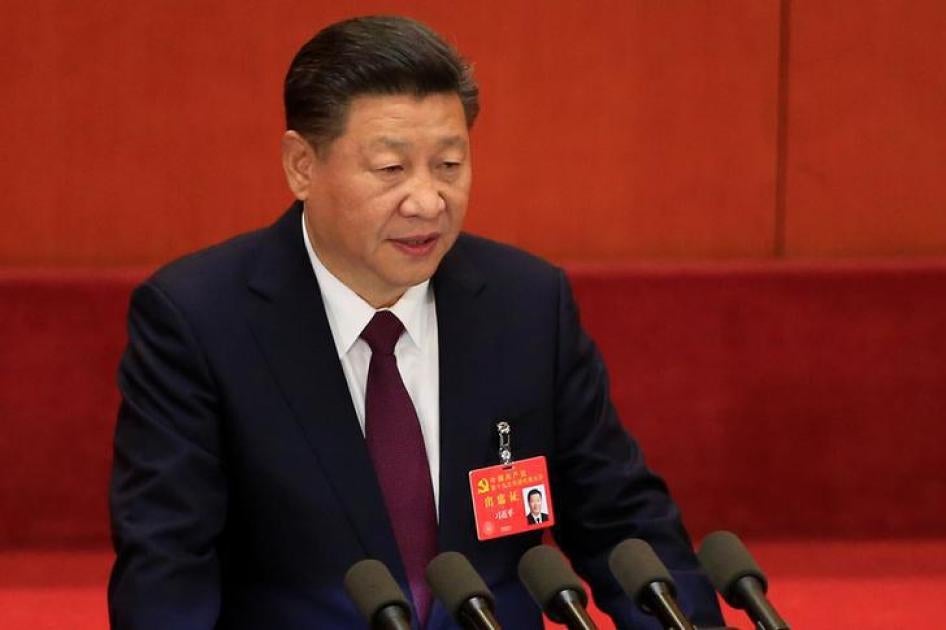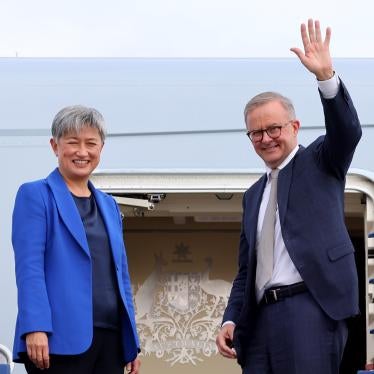Prime Minister Anthony Albanese’s visit to China, starting on Saturday, marks the 50th anniversary of the first visit by an Australian prime minister, Gough Whitlam, in 1973. Albanese has reflected that the principles behind Whitlam’s China vision still drive Australia’s relationship with China.
Whitlam’s vision for the Chinese-Australian relationship was undoubtedly focused on expanding trade. But it was more than that. While in China in 1973, he said: “I wanted to make this visit in my first year of office as a demonstration of the significance attached by the Australian people to developing relations with China, and in the belief that our two countries should now work in concert for the mutual benefit of the welfare and security of our two peoples.”
What could be more pertinent to welfare and security than respect for human rights? And, over the past 50 years it has become clear that China’s and Australia’s human rights realities are increasingly intertwined.
Whitlam was particularly focused on the adoption of international agreements that are still used to safeguard human rights today. But Albanese’s visit comes at a time when the Chinese government is working to weaken the multilateral human rights system. It is trying to reposition international human rights law as a matter for state-to-state relations rather than a global obligation to protect individuals.
The Chinese government tries to pursue rights-free development around the world. It has attempted to neutralise United Nations human rights mechanisms’ scrutiny of China and, more broadly, weaken the UN’s ability to hold governments accountable for serious violations.
And the Chinese government is committing serious human rights violations, from crimes against humanity in Xinjiang to technology-enabled repression, transnational repression against perceived dissidents abroad, dismantling democratic institutions in Hong Kong and arbitrarily detaining human rights defenders, including Australian citizens.
And while Albanese is in China, the 50-year anniversary provides an opportunity to reflect on the Chinese government’s approach to an issue that was a central focus for Whitlam – labour rights. The Whitlam government ratified significant human rights instruments, including core International Labour Organisation conventions – treaties designed to protect workers’ rights. The Chinese government’s flagrant violations of labour rights, including its prohibition of independent unions, are in stark contrast to the laws Whitlam worked so hard to enshrine in Australia.
While China ratified two key ILO treaties on forced labour before an April 2022 visit by then-UN human rights chief Michelle Bachelet, a UN report last year found the Chinese government’s actions against Uyghurs and other Turkic Muslims in Xinjiang “may constitute crimes against humanity”, and that its labour policies in the region “appear to be discriminatory in nature or effect, and to involve elements of coercion”.
The UN’s Xinjiang report recommended that businesses ramp up efforts to address human rights risks in their operations and supply chains, many of which include links to Xinjiang. A number of governments have restricted imports or taken other measures to curb forced labour, including in Xinjiang, while others are implementing due-diligence laws requiring companies to conduct stronger oversight of their global operations and supply chains. Australia still has done neither.
In a letter to Albanese about this visit, Human Rights Watch said the Australian government should take action to demonstrate to China that this oppression and the threat it poses to the international human rights system should stop. There are a number of ways to do this.
Australia should state that it will join other governments to support international investigations into atrocities in Xinjiang. The prime minister should talk to victims and survivors of Chinese government human rights violations upon his return. The Australian government should spearhead a coalition of like-minded governments to initiate a project to help Uyghurs in other countries locate missing family members in Xinjiang.
When they meet on Monday, Albanese should publicly ask President Xi Jinping to release Australians wrongfully detained in China, including Yang Hengjun, and make clear that arbitrary detention of anyone, Australian citizen or not, is unacceptable. He should inform his counterparts that Australian authorities will vigorously investigate and appropriately prosecute repression by Chinese officials and their proxies in Australia who violate Australian law, including harassing, intimidating and carrying out surveillance of critics of the Chinese government. And he should make clear that the Australian government will work with allies so they do the same in their countries.
Finally, the Australian government should demonstrate support for media freedom by holding a briefing both in China and upon return so that journalists barred from China and Hong Kong can participate.
When Whitlam died, Albanese reflected: “He taught us to be brave – brave about our reform ambitions, brave in the face of our critics and unstintingly brave in the pursuit of the greatest ambition any of us could ever pursue: justice and opportunity for all.”
While Whitlam did not publicly raise the Cultural Revolution and grave human rights violations in his 1973 speech in Beijing, Albanese should be different. Albanese has an opportunity to be brave and to pursue justice and to advocate for the welfare of Australians and Chinese people. The question is whether Australia will face that challenge squarely.









